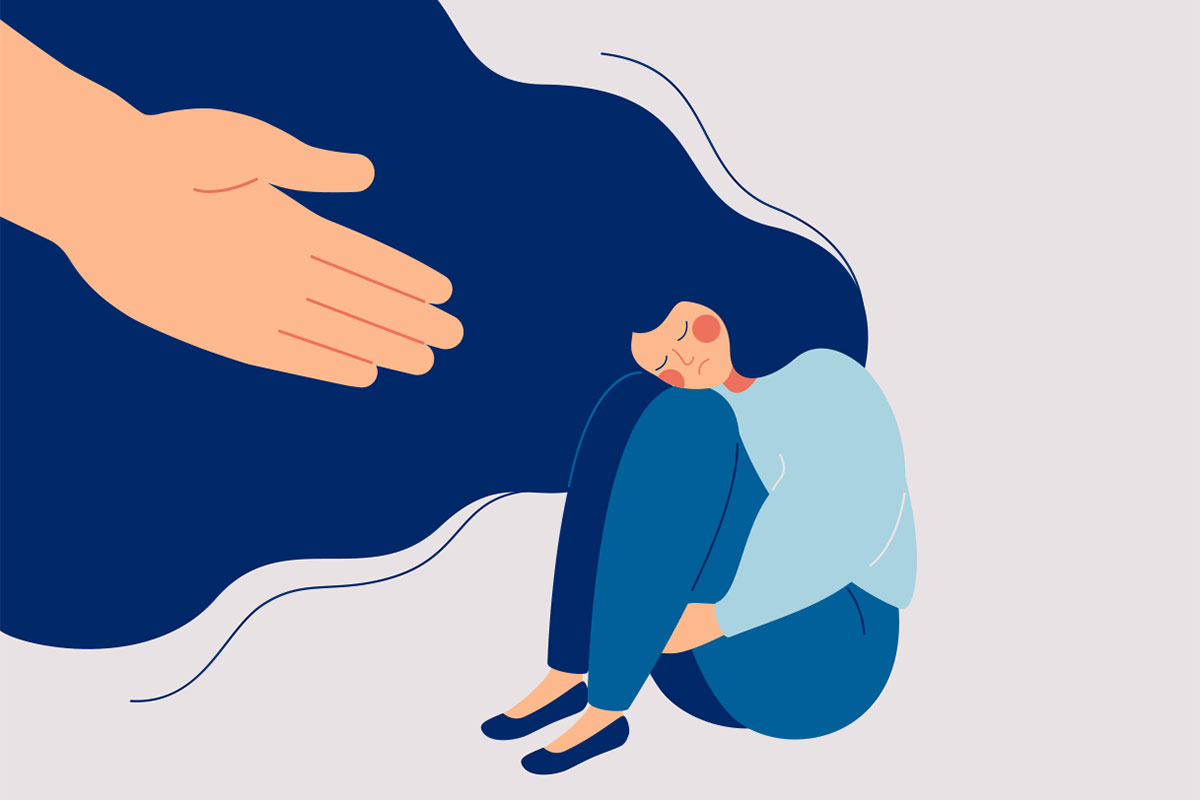A new study co-authored by John Allegrante, Professor of Health Education, has found that COVID-19 has had a significant, detrimental impact on adolescent mental health, especially in girls, but that use of substances like cigarettes and alcohol declined during the pandemic.
The study of more than 59,000 Icelandic adolescents by Allegrante and a team of Icelandic and North American behavioral and social scientists, was published on June 3 in The Lancet Psychiatry.

John Allegrante, Professor of Health Education. (Photo: TC Archives)
According to the authors, the study is the first to document age- and gender-specific changes in adolescent mental health problems and substance use during the COVID-19 pandemic, and compare them to trends that were appearing before the pandemic.
Investigators found that negative mental health outcomes were disproportionately reported by girls and older adolescents (13-18-year-olds) in 2020, compared to same-age peers prior to the pandemic.
This finding suggests that interventions intended to lessen the negative impact of the pandemic on adolescent mental health might help improve the mental health outlook for young people around the world who have been out of school and isolated at home during the pandemic, said Allegrante, also an affiliated professor of sociomedical sciences at the Columbia University Mailman School of Public Health, who served as a collaborating senior investigator on the study.
“Isolation during the pandemic has been universal and it is global, and it is having a clinically important, negative impact on young people who have not been in school during the pandemic,” said Allegrante.“Whether an adolescent was an Icelander in Reykjavik who had been at home for most of the last year or an American in New York City, living under the same circumstances — being at home, engaged in remote learning and separated from friends — the consequences of not going to school not only set back their learning but also negatively affected their mental health. What we don’t know is by how much.”
Isolation during the pandemic has been universal and it is global, and it is having a clinically important, negative impact on young people who have not been in school during the pandemic.... The consequences of not going to school not only set back their learning but also negatively affected their mental health.
— John Allegrante, Professor of Health Education
Allegrante added, “The study shows that population-level prevention efforts, especially for girls, are warranted,” but that “more study is needed to determine the long-term effects of quarantine and being socially isolated from one’s peers, including the effects on learning and academic achievement and relationships with parents, siblings, and peers.”
The multi-year, population-based study was designed to answer research questions for a defined population, but offers answers that can apply to the whole population addressed in the study, not only to the individuals included in the study.
Researchers administered surveys to a nationwide sample of 13–18-year-old Icelanders in October or February in 2016 and 2018, and in October, 2020 (during the COVID-19 pandemic). The surveys assessed depressive symptoms and mental wellbeing with commonly used, validated symptom checklists and scales. They also asked the teens about the frequency of cigarette smoking, e-cigarette use, and alcohol intoxication. Demographic data, including language spoken at home, were collected, but not ethnicity data. The researchers also studied the effect of gender, age, and survey year on trends in mental health outcomes.
The study found an increase in depressive symptoms and worsened mental wellbeing across all age groups during the pandemic compared with same-aged peers before COVID-19. The symptoms were “significantly worse” in adolescent girls compared with boys. While researchers measured a clinically significant increase in mental health problems, cigarette smoking, e-cigarette use, and alcohol intoxication declined among 15–18-year-olds during COVID-19, with no similar gender differences.
In the study, 59,701 survey responses were included and were the basis for the analysis; response rates ranged from 63% to 86%. An increase in depressive symptoms and worsened mental wellbeing were observed across all age groups during the pandemic compared with same-aged peers before COVID-19. These outcomes were significantly worse in adolescent girls compared with boys. Cigarette smoking, e-cigarette use, and alcohol intoxication declined among 15–18-year-olds during COVID-19, with no similar gender differences.

Clockwise from top left: Ingibjorg Eva Thorisdottir, Thorhildur Halldorsdottir, Inga Dora Sigfusdottir and Alfgeir L. Kristjansson. (Photos: TC Archives)
Ingibjorg Eva Thorisdottir, chief data analyst at the Icelandic Centre for Social Research and Analysis (ICSRA) at Reykjavik University (who studied at Teachers College in 2009 as part of an exchange with Reykjavik University), was the principal investigator and lead author of the report. She and Thorhildur Halldorsdottir, a clinical psychologist and assistant professor of psychology at Reykjavik University who is the study co-principal investigator, write that the study represents a “landmark contribution to what we now know about just how psychologically devastating being socially isolated from peers and friends during the ongoing pandemic has been for young people.”
The study represents a landmark contribution to what we now know about just how psychologically devastating being socially isolated from peers and friends during the ongoing pandemic has been for young people.
— Ingibjorg Eva Thorisdottir and Thorhildur Halldorsdottir
According to the researchers, prior studies have not been designed to determine whether clinically relevant levels of depression — as opposed to self-reported depressive symptoms — and substance use have increased during the pandemic.
Previous studies of adolescents found evidence that COVID-19 prolonged an upward trend in mental health problems and certain types of substance use that had been in place before the pandemic. The Iceland study, however, compares current data with several pre-pandemic time points, which enabled the researchers to separate the effect of COVID-19 from previous trends in adolescent mental health, Allegrante said.
The “results underline the significance of social relationships in the health and well-being of youth and the importance of nurturing and maintaining strong social support mechanisms in their lives,” said Alfgeir L. Kristjansson, a former postdoctoral fellow with Allegrante at TC in 2010-12, senior scientist at ICSRA and an associate professor of public health at West Virginia University, who is a co-author of the study. “The Lancet Psychiatry study report highlights these findings at population scale.”
Additional investigators and coauthors on the study, which was funded by the Icelandic Research Fund, include Bryndis Bjork Asgeirsdottir, professor of psychology at Reykjavik University; Heiddis Bjork Valdimarsdottir, professor of psychology at Reykjavik University and the Icahn School of Medicine at Mount Sinai; Inga Dora Sigfusdottir, professor of sociology at Reykjavik University who also has been a research professor at Teachers College; and Erla Maria Jonsdottir Tolgyes, chief project officer, and Jon Sigfusson, managing director, both at the Icelandic Center for Social Research and Analysis.
In a commentary that accompanies the article’s publication, Gertrud Sofie Hafstad and Else-Marie Augusti, both senior researchers at the Norwegian Centre for Violence and Traumatic Stress Studies in Oslo, write that the study “clearly shows that gauging the mental health status of adolescents over time is of imminent importance.”
